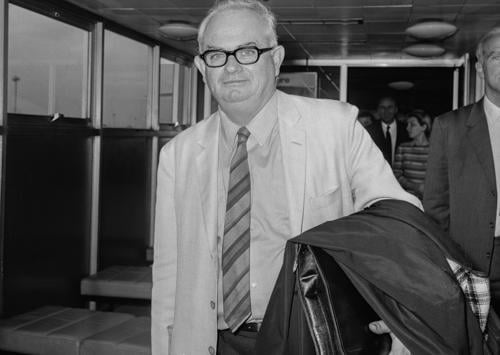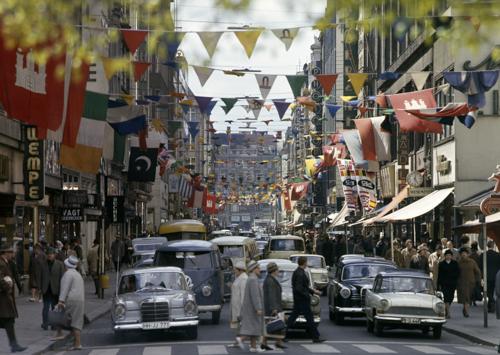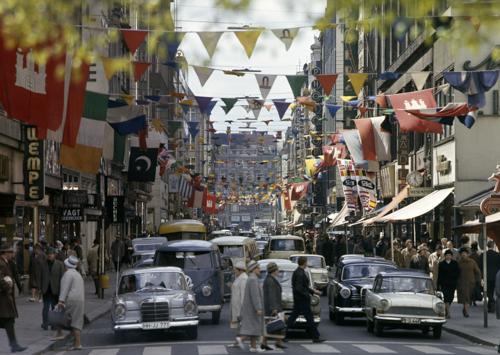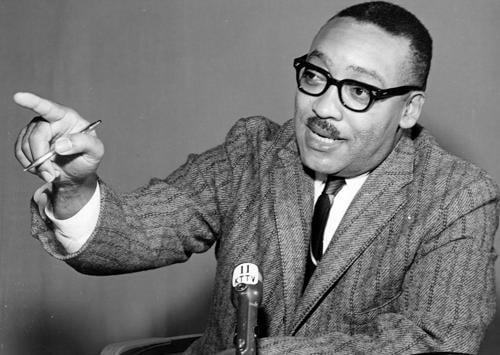Listen to New Voices on Studs Terkel our partnership with 826CHI-here! Read the Story
Showing 1 - 15 of 39 results
-
William Shirer discusses his book “Twentieth Century Journey: 1930-1940: Volume II”
Jun. 1, 1984 Discussing the book "Twentieth century journey: 1930-1940" with the author William Shirer.
-
William Shawcross discusses his book “Sideshow: Kissinger, Nixon and the Destruction of Cambodia”
May. 25, 1979 Investigative journalist William Shawcross speaks with Studs Terkel about Cambodia, Henry Kissinger, and Shawcross’ book, “Sideshow: Kissinger, Nixon and the Destruction of Cambodia.” Both Terkel and Shawcross read excerpts from Shawcross’ book and Terkel reads an excerpt from an interview Henry Kissinger did with reporter Theo Summer.
-
Wilfred Burchett discusses about his career on journalism
Oct. 24, 1977 Wilfred Burchett (an Australian journalist) discusses his journalism career. He was reporting conflicts in Asia (North Korea, Vietnam, China and Japan) and their Communist supporters. He speaks briefly about his experiences in Nazi Germany and concentration camps. Towards the end of the interview he talks about his interest in learning and reporting more about the new euro-communism (prominent in Italy, Spain and France).
-
Tom Wicker discusses his book "On Press: A Top Reporters Life In, And Reflection On, American Journalism"
May. 18, 1978 Wicker discusses advocacy journalism versus objective journalism, freedom of the press, and the role of the press in American society.
-
Sydney J. Harris discusses his book "Pieces of Eight"
Nov. 3, 1982 Journalist and author Sydney J. Harris discusses the essays in his new book "Pieces of Eight." Harris previously wrote for the "Chicago Daily News" and as of the time of this interview, was writing for the "Chicago Sun-Times."
-
Studs Terkel talks with Erich Lüth on his first hand experiences living in Hamburg through the rise and fall of Hitler ; part 1
1968 Erich Lüth discusses his experiences, observations, and accounts of life in Hamburg, Germany during the rise and fall of Hitler. He recounts how as a member of Parliament he brought in Hitler's, "Mein Kampf" and read portions aloud and was laughed at by his colleagues. He states they were blind to what Hitler declared in his book he would do and some are still blind by wanting to rub out their past, their history.
-
Studs Terkel concludes his interview with Erich Lüth going more in depth on the aftermath of the war on Germany's youth ; part 4
1968 Erich Lüth's discussion with Studs Terkel is similar to part 3 but Luth offers a more in-depth conversation on the role of teachers in schools and how the time of Hitler is taught. There were those teachers that joined the party to continue their love of teaching and those teachers that were brought into the Nazi Party to follow their convictions. This lack of courage to resist influences pupils today because teachers are not saying they were cowards. The relationship is altered out of shame, and embarrassment.
-
Reporter and author John L. Spivak talks about his autobiography with Studs Terkel ; part 2
1967 Several aspects of Spivak's career are discussed in detail, including his exposure of chain gangs, a Depression-era Communist forgery, investigating the anti-Nazi underground in Germany and how to exploit the insecurities of vigilantes.
-
Raymon Bonner discusses his book “At the Hand of Man: Peril and Hope for Africa’s Wildlife”
Apr. 29, 1993 Interviewing Raymond Bonner, foreign correspondent and author of “At the Hand of Man.” He discusses wildlife conservation, the poaching trade, and animal rights. Includes a 30 second test tone. Content Warning: This conversation has the presence of outdated, biased, offensive language. Rather than remove this content, we present it in the context of twentieth-century social history to acknowledge and learn from its impact and to inspire awareness and discussion.
-
Rahul Barpute discusses his career and life experiences ; part 2
Aug. 29, 1963 Actor and editor of the newspaper Majhi Kahani, Rahul Barapute discusses his first impressions and experiences in the United States.
-
Paul Cowan discusses his book "An Orphan in History"
Jan. 7, 1983 Discussing the book "An orphan in history: retrieving a Jewish legacy" with the author Paul Cowan.
-
Oriana Fallaci discusses her career and journalism
Jun. 10, 1977 Italian journalist Oriana Fallaci discusses journalism and what she has learned from powerful politicians that she has interviewed over the course of her career. Much of the conversation comes back to her late companion, Alexandros Panagoulēs. She briefly mentions her most recent book "Interview With History." Two songs by Mikis Theodorakis are played at the conclusion of the interview: (00:49:02-00:50:57) "To Palicari Echi Kaimo" (00:51:00-00:52:40) "S'afti Ti Geitonia-In This Neighborhood"
-
Louis Lomax discusses the book "Thailand: The War That Is, The War That Will Be"
1967 Discussing Thailand and interviewing journalist Louis Lomax. Includes passage from book.
-
Joshua Rubenstein discusses his book Tangled Loyalties: The Life and Times of Ilya Ehrenburg"
Sep. 25, 1996 Joshua Rubenstein discusses his book "Tangled Loyalties: The Life and Times of Ilya Ehrenburg" and the importance of Ehrenburg during the Stalin regime.
-
James Cameron discusses journalist responsibility and expectations of political leaders with Studs in Ashburn Gardens, London ; part 2
Studs Terkel interview with James Cameron, Brittish journalist. They discuss the objective truth and facts of journalism. Cameron shares his experience with a dying Winston Churchill and his views on science and human values. Politics, youth, and the atomic bomb are also topics in this interview. Studs quotes Albert Einstein and Sidney Burnstein, while Cameron quotes Oliver Cromwell. James Cameron's book, "Point of Departure" is also mentioned in the interview.






